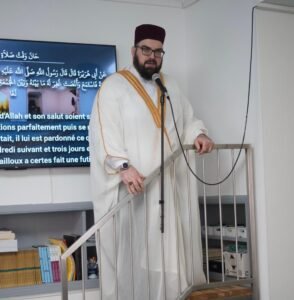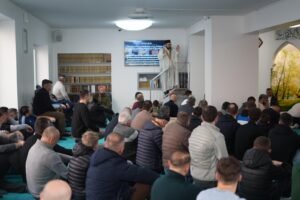Central khutbah: “When Friendship is Touched by the Coldness of This World” (Gallery + Video)
The coldness of this world can separate even the warmest of hearts. It is reported from Halid ibn ’Umara al-’Adawi (may Allah be pleased with him) that he said:
“The governor of Basra, Utba ibn Ghazwan, delivered a sermon to us. He praised Allah and said:
‘This world has shown its fleeting nature and is turning away from us. Nothing remains of it except as much as the handle of a vessel that its owner holds.
You will soon leave this world for an abode where nothing is transient, so depart with the good deeds you have.
We have heard that a rock will be thrown from the top of Hell, and it will fall for seventy years without reaching the bottom. By Allah, it will be filled! Does this amaze you?
We have also heard that the distance between two gates of Paradise is as far as a forty-year journey, and a day will come when they will be crowded.
I remember myself among seven companions with the Prophet (peace and blessings be upon him). We had no food except the leaves of trees, to the extent that our lips would crack.
I took a cloak, split it with Sa’d ibn Malik, and wore half of it while Sa’d wore the other half. Today, there is no one among us who has not become a governor of a city.
I seek refuge with Allah from seeing myself as great in my own eyes while being small in the sight of Allah.’” (Muslim)
The Qur’an highlights the closeness of the believers’ hearts as one of the greatest blessings of Allah. In Surah Al-Imran, verse 103, Allah the Most High says:
“And remember the favor of Allah upon you when you were enemies, and He brought your hearts together, and you became, by His favor, brothers.”
In Surah Al-Anfal, verse 63, Allah says:
“And He brought together their hearts. If you had spent all that is on the earth, you could not have brought their hearts together; but Allah brought them together.”
In Surah Al-Hujurat, verse 10, Allah says:
“The believers are but brothers, so make reconciliation between your brothers and fear Allah that you may receive mercy.”
Similarly, in Surah Al-Fath, verse 29, Allah describes the believers as being merciful toward one another:
“Muhammad is the Messenger of Allah; and those with him are severe against the disbelievers, merciful among themselves.”
This closeness and love among believers are signs of Allah’s mercy and His power.
True Happiness Lies in the Hearts of Believers
Our happiness depends on others to the extent that we bring them joy, peace, or, conversely, provoke them with insults, slander, envy, or malice. These emotions and behaviors directly reflect back on us. Negative feelings toward others lead to disruption in our personal lives.
In personal, non-professional relationships, a person who learns to channel their emotions positively becomes someone highly desirable in their social circle. Not only is such a person beloved by their Lord if they act for His sake, but they are also loved by people due to the positive energy they radiate.
It is reported that Abu Darda (may Allah be pleased with him) never spoke to people without smiling. His wife once said to him:
“I fear people may think you are foolish (or unserious) because you smile all the time.”
He replied:
“I have never seen the Prophet (peace and blessings be upon him) speak without smiling.” (Esh-shabab wa al-mizah, 26)
The Coldness Between Believers’ Hearts Can Only Be Temporary
Salahuddin as-Safadi mentioned in his encyclopedic work Al-Wafi bil-Wafayat a story that occurred between Hassan al-Basri and Ibn Sirin.
At one point, a distance and cooling of relations occurred between them. When Ibn Sirin’s name was mentioned in front of Hassan al-Basri, he would say:
“Spare us from talking about those weavers,” alluding to the fact that most of Ibn Sirin’s family were weavers.
Later, Hassan al-Basri had a strange dream. He saw himself naked, standing on a heap of garbage, striking it with a stick. Disturbed, he sent one of his students to consult Ibn Sirin for an interpretation of the dream, asking him not to reveal who had the dream.
However, Ibn Sirin, wise and perceptive, responded:
“Tell the one who had this dream: Do not ask a weaver to interpret it.”
When this response reached Hassan al-Basri, he immediately went to Ibn Sirin. Upon seeing him, Ibn Sirin stood up, embraced him, and they reconciled their differences.
Hassan al-Basri then said:
“Abu Bakr, forget what happened. Instead, interpret this dream that is troubling me.”
Ibn Sirin replied:
“Do not worry about this dream. The nakedness you saw represents the nakedness of this world, but you are not among those who seek it. As for the heap of garbage, it represents this world as it truly is. As for the stick, it is the wisdom you share with people.”
Hassan al-Basri asked:
“How did you know it was I who had this dream?”
Ibn Sirin replied:
“I know of no one better than you who could have had such a dream.”
This story reminds us of the importance of overcoming disagreements and preserving relationships, for returning to the truth is always better than persisting in error.
(Central khutbahs by the religious leader Hafiz Hilmija Redžić on December 20, 2024, at the “Centre Islamique Gazi Isa-beg” and the „Centre Islamique et Culturel Berat“ in Esch-sur-Alzette)


